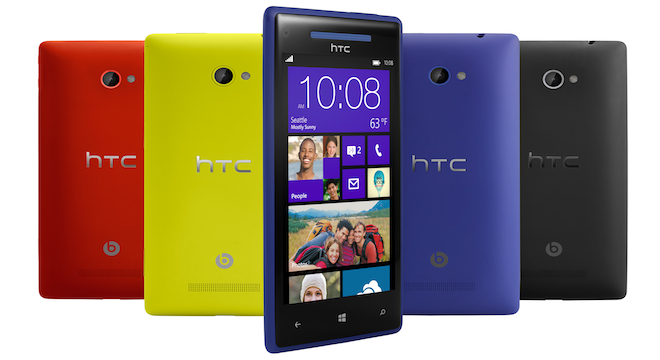NEW YORK — Microsoft CEO Steve Ballmer joined his counterpart from Taiwanese phonemaker HTC, CEO Peter Chou, on stage at an exhibition hall in Manhattan on Wednesday to announce what Ballmer called “HTC’s and Microsoft’s biggest endeavor yet”: Two new smartphone models, the HTC Windows Phone 8X and 8S.
The 8X is the larger and more powerful of the two, with a faster processor, a higher-resolution back camera and a 4.3-inch touchscreen, compared to the 4-inch screen found on its counterpart. The 8X also has a front-facing camera for videoconferencing, which the 8S lacks. Both phones will be available in the U.S. “in November” at Verizon, AT&T and T-Mobile, though no specific release date nor prices have been announced.
As the names indicate, both devices run Microsoft’s upcoming new Windows Phone 8 mobile operating system, a striking and unmistakable piece of software that relies on a series of multicolored “tiles” for navigating to apps and features, which Microsoft is hoping will be able to reverse its rapid decline in smartphone market share over the past three years.
HTC is also hoping that consumers will be swayed by one key unique feature: “Beats (by Dr. Dre)” brand audio playback, which isn’t found on other companies’ smartphones.
The release of HTC’s new phones comes on the heels of Apple’s recent unveiling of the new iPhone 5, which, despite lacking any major surprises, has gone on to sell 2 million units in its first day of pre-order availability, a new record for the company, making it an especially uphill battle for Microsoft and HTC.
Microsoft and HTC are both among those seeking to draw attention and consumers away from the smartphone market leaders: Apple’s iPhone and the growing list of running Google’s Android operating system, but manufactured by other parties such as South Korea’s Samsung.
No surprise then that the event on Wednesday, while officially hosted by HTC, was as much another introductory party for Windows Phone 8 as it was for HTC’s hardware.
“HTC is basically naming the phones ‘Windows Phone,’ in lieu of another sub-brand,” said Ross Rubin, principal analyst and founder of market research firm Reticle Research, in a phone interview with TPM, “They [HTC] are clearly positioning themselves as investing more in this operating system.”
HTC executives said that they used Microsoft’s Windows Phone 8 operating system as the inspiration for the physical design of the new HTC 8X and 8S phones themselves.
“The results are phones that are perfect 3D embodiment of the simple, pure design of the [Windows Phone 8] tile,” said Scott Croyle, HTC’s head of design.
It shows in some obvious aspects: The phones are each available in a variety of four bright colors, evocative of the Windows Phone 8’s multicolored, customizable tiles, and they are both sleek and minimalistic, with buttons flush with the rest of the phone bodies (“no bumps or protrusions,” as Coyle put it). Here’s a promotional image of the two-toned HTC Windows Phone 8S:

Yet HTC itself makes one of the best–reviewed smartphones running Google’s Android, the HTC One X, an uneasy balancing act that indicates the company isn’t betting the farm on Windows Phone 8, or necessarily devoting the full efforts of its phone design and manufacturing resources toward it.
“I certainly think both Google and Microsoft would like to see companies commit as much as attention and resources as they can to designing developing and marketing and selling their own operating systems,” Rubin said.
That said, both Google and Microsoft each have their own exclusive phone manufacturers: Motorola in the case of Google, as Google just completed its $12.5 billion acquisition of the company in May; Nokia in the case of Microsoft, as those two companies have an exclusive joint venture.
But Nokia’s partnership with Microsoft hasn’t borne much fruit for either company yet: Their first exclusive smartphone, the Nokia Lumia 900, hasn’t sold very well, but both companies are plowing ahead with another attempt, the Nokia Lumia 920 and 820, unveiled just two weeks ahead of the HTC Windows Phones.
Despite or because of that, the new HTC Windows Phones may be the best attempt yet by Microsoft and any of its hardware partners to steal the thunder away from Apple iPhone and Google’s Android phones, if only because unlike Nokia, HTC actually gave some concrete buying information to consumers: Where the phones would be available and roughly when, which is still more than can be said of Nokia’s new Lumias, though recent reports have suggested they too will be available in November in the U.S.
“Having HTC say a phone will be available on Verizon or T-Mobile establishes in the mind of a customer of those carriers, ‘Hey this is going to be an option for me,'” Rubin told TPM. “Whereas for Nokia, a carrier customer might be interested in handset but doesn’t know whether its going to be available or not, or whether they should wait for it or not, and that may be a limiting factor.”
Still, when it comes down to it, Microsoft and its Windows Phone 8 partners may all be battling for a second place finish to the iPhone when it comes to individual phone handset models.
“They’re trying to build up the [Windows Phone 8] ecosystem,” Rubin said of the companies. “They’re trying to steal share away from Android more so than the iPhone.”






